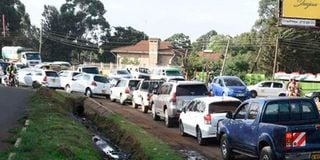Transport crisis as fuel shortage bites in the North Rift

Motorists queue to fuel at one of the few petrol stations that had diesel and petrol in Eldoret town, Uasin Gishu County on March 28, 2022.
Thousands of motorists have withdrawn their vehicles from the road due to the acute shortage of fuel that has hit several parts of the North Rift amid hoarding claims.
Despite assurances from the regulator that supply issues had been resolved after talks involving the Ministry of Petroleum and Mining, oil marketers and other stakeholders, normality was yet to return in the region.
Independent petroleum dealers told the Nation on Wednesday that the crisis would persist until the government assures shippers of compensation for landed fuel, which costs over Sh164 a litre.
“Our wholesalers say they won’t release the fuel to the dealers unless they are compensated for the increased prices. If not, they won’t release the fuel and if they do so, then consumers should be ready to buy it at above Sh160 per litre,” said Mr Collins Boinett, a dealer.
He said they were waiting to hear from shippers, who were in a meeting with energy officials over the crisis. There has been a shortage of fuel in Eldoret, Uasin Gishu, and neighbouring counties for over a week.
Fuel stations that still have fuel have since hiked pump prices by up to Sh5 per litre from the recommended Sh135 for petrol.
In a statement on Monday, the Energy and Petroleum Regulation Authority (Epra) said there was enough fuel and consumers should panic. The regulator said the fuel shortage in parts of Western Kenya and the North Rift was caused by what it called “some unprecedented logistical constraints”.
“These challenges have caused independent petroleum dealers to run out of petroleum stocks,” the regulator said. Taxi drivers on the streets of Eldoret lamented that they had parked their cars because they could not find fuel.
“Our business has now become periodical. You can only operate when you get fuel and you park the car when you run out. Some stations have capped giving out fuel at Sh2,000. We can’t meet our daily targets,” said taxi driver Paul Muya.
In Turkana, most fuel stations in Lodwar remained closed after running dry, and those still operational were still witnessing long queues. Most lamented that they were getting to work late and spending more than four hours in queues waiting to be served.
Mr Kennedy Simiyu, who spent hours queuing at a petrol station until midnight, had to rescue his neighbour, who had to siphon fuel from his motorcycle to take his wife to Lodwar County and Referral Hospital.
Travellers also had to dig deeper into their pockets after fares were hiked. The shortest distance that used to cost Sh50 in Lodwar now costs Sh100.
In Nandi, political rallies that have been recording high numbers of boda boda operators saw fewer numbers of them. The operators have been escorting aspirants, particularly the three front-runners in the gubernatorial race, Governor Stephen Sang, Mr Allan Kosgey and Dr Cleophas Lagat.
The shortage also affected major towns in Baringo County, with motorists counting huge losses after their businesses were grounded. Some had not been able to resume work since Monday.
Mr Kevin Kenei, an operator, said they were wasting a lot of time queuing at petrol stations, only to be told that the fuel had run out due to high demand and little supply.
“In a good day, I used to spend Sh400 on fuel and get a profit of Sh600. But due to the shortage since last week, I have incurred big losses, because with the little I have, I only ferry clients within Kabarnet town,” he said.
Mr Isaac Cheboi, a farmer from Uasin Gishu, said: “Major stations in the town have no fuel, while National Oil was only allowing government vehicles on Tuesday. There was no activity at the station on Wednesday.
“Farmers have also expressed frustration over the fuel shortage, which may affect planting as the long April rains start, because they cannot fuel tractors.
“I have been queuing for fuel in one of the stations to no avail. It has never been sufficient since we are given on a first-come, first-served basis.”
In Bungoma, motorists had to cross to neighbouring Uganda to get the precious commodity. Mr Derrick Were, a tax operator, said fuel was available in Malaba.
Boda boda riders who got the opportunity to refill their tanks, sought to buy enough to last about three days. Some dealers, however, were refusing to sell more than Sh500 in fuel, limiting it to Sh200 per rider.
Reporting by Fred Kibor, Brian Ojamaa, Florah Koech and Sammy Lutta





